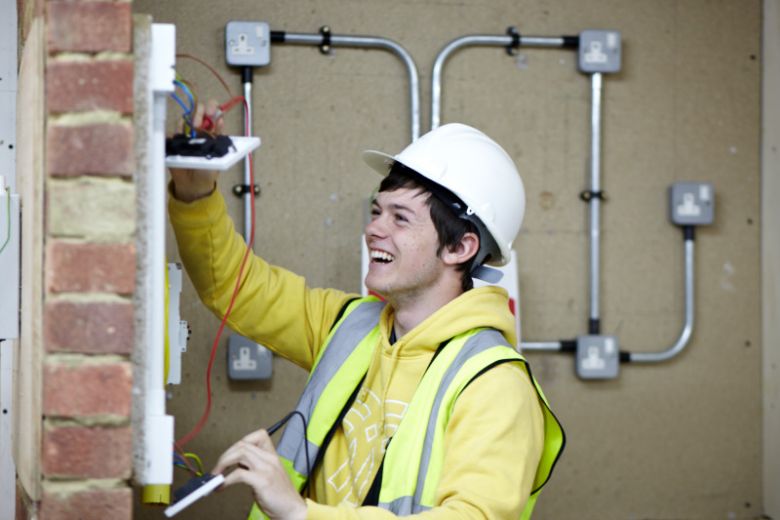
Overview
Providing students with a grounding on the basics of Electrical Installation, this 1-year qualification does not make candidates fully qualified electricians but provides underpinning knowledge that will contribute to employment or further training for completion of NVQ. The course will be taught through a range of varied activities including classroom-based theory sessions and skills workshops to develop the necessary installation skills and experience. You will be trained by qualified Electricians with a Gold Card and a wide range of industry experience.
Course Content
The City & Guilds Level 2 Foundation Technical Certificate in Electrical Installation covers key areas for a career in electrical installation:
Site and Electrical Health and Safety:
-
Safety regulations, risk assessments, and safe working practices.
-
Use of PPE and compliance with health and safety standards.
Principles of Electrical Science:
-
Basic electrical theory (voltage, current, resistance).
-
AC/DC circuits, magnetism, electromagnetism, and power calculations.
Practical Installations, Regulations, and Procedures:
-
Electrical installation methods and materials.
-
Wiring regulations (BS 7671), testing, earthing, and safety devices (fuses, RCDs).
Installation Techniques:
-
Circuit installation, cable sizing, and fitting electrical components.
-
Basic electrical system design, testing, and commissioning.
Assessment:
-
Practical assignment (installation and testing).
-
Online theory exam covering electrical science, installation techniques, and safety.
This qualification prepares students for entry-level roles and further study in electrical installation.![]()
Entry Requirements
To enrol in the City & Guilds Level 2 Foundation Certificate in Electrical Installation course, you’ll need:
- 4 GCSEs at grade 3-9, and a grade 4 in either English or maths.
-
Level 1 Electrical Qualification
-
This is a highly popular course - previous experience in a building environment is desirable.
Careers
Students of the City & Guilds Level 2 Foundation Technical Certificate in Electrical Installation qualification can pursue a variety of career opportunities in the electrical and construction sectors, including:
Electrical Installer: Install and maintain electrical systems in residential, commercial, or industrial buildings.
Electrical Technician: Assist in the design, testing, and maintenance of electrical systems and equipment.
Domestic Electrician: Specialises in installing and repairing electrical systems in homes, including lighting, wiring, and appliances.
Maintenance Electrician: Carry out routine inspections and repairs on electrical systems in commercial and industrial environments.
Construction Electrician: Work on electrical installations at building sites, ensuring all wiring meets regulations and safety standards.
Apprentice Electrician: Gain hands-on experience and additional qualifications while working under the supervision of qualified electricians.
Electrical Engineer: Design, develop, and oversee the installation and maintenance of electrical equipment and systems.
Industrial Electrician: Work in manufacturing and industrial settings, maintaining complex electrical systems used in machinery and production lines.
Electric Vehicle (EV) Charging Specialist: Install and maintain electric vehicle charging stations as the demand for EVs increases.
Electrical Estimator: Calculate the cost of electrical installations for construction projects and other electrical work.
Health and Safety Officer: Oversee electrical safety protocols to ensure compliance with laws and regulations in construction and industrial settings.
You can also pursue further study or apprenticeships to enhance your skills and gain qualifications for more advanced roles.